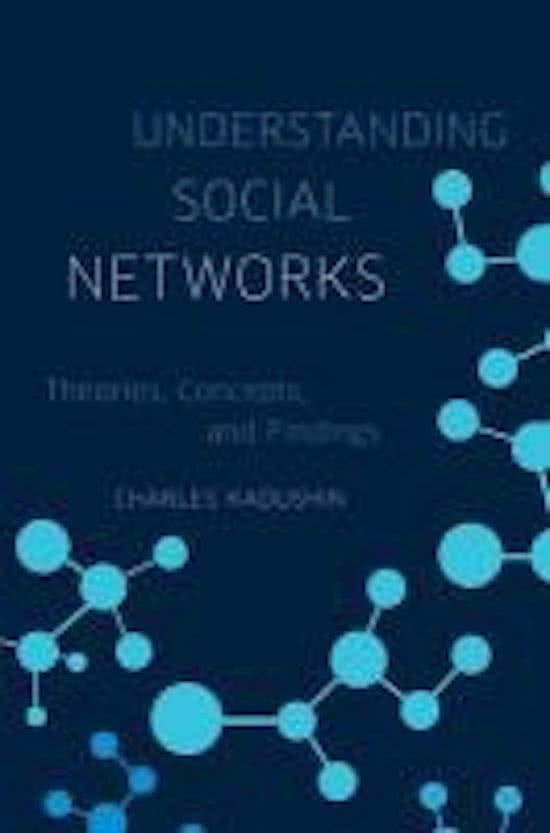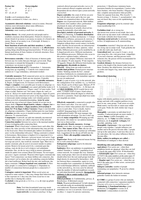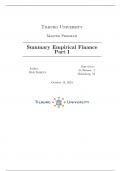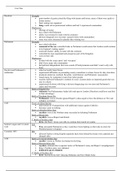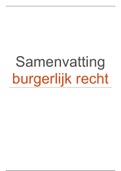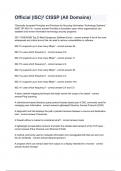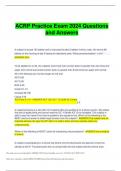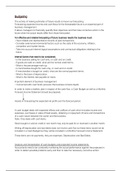Partner list Tie/arc/edgelist centrisch oftewel personal networks (survey) 2. protection), 2. Beneficence (minimize harm,
A1 – a3 a1 a3 1 Socio-centrisch oftewel complete networks 3. maximize benefits for respondents) 3 justice (who
A2 – a3 a2 1 Respondent-driven oftewel open system networks bears burdens, who bears benefits). Omgaan met
A3 – a2, a4, a5 enz. (sneeuwbal) data: complete anonymisation when possible.
Degree centrality: the count of all ties an actor Name list separate from data. Who benefits? 1.
2 cycle: a en b nomineren elkaar has with all other actors and is the row sum Society at large, 2. Science, 3. second parties’ who
3 cycle: a nomineert b, b doet c en c doet a. (column for symmetrical data) of the cell entries. may not know they were at risk (epidemiology
Degree: size of personal network. Hubs hebben studies)
Asymmetric (directed) relations: vertical in nature. Directed uitschieters door matthew effect, preferential Exogenous subgroups: given by external value
relations more information about status differences. attachment & status self reinforcement. (team membership bvb)
Agency: see structuralism Density = proportion of actually observed ties
Autonomy: mate waarin je onafh bent van anderen. among the potentially observable ones. Forbidden triad: als er strong ties
Descriptive statistics of personal networks: 1. zijn tussen twee actoren in een triade, dan is de
Balance theory - In a triad, positively tied people tend to Degree, 2. Clustering, 3, Geodesic distribution derde actor op zijn minst zwak verbonden, anders
establish consensus about third parties. Friend of a friend is a Diffusion: goes via three mechanisms: 1. Contact is de triade verboden door Granovetter
friend, friend of an enemy is an enemy en enemy of a friend is an that involves influence, persuasion & coercion, 2. Functions social network: 1. informatie toegang
enemy. Enemy of an enemy is an: (Cartwright & harary) = Contact that involves emulation and imitation 3. in flow, 2. hulpbronnen en 3. samenwerking
friend. Davis: an enemy. Adoption without direct social contact (via books,
Basic functions of networks and their members: 1. safety mails, blavbla) Social networks are infrastructure G-transitive: transitief 3 ding kan ook als twee
(community and support/closure & cohesion) vs 2. effectiveness that enables diffusion of ideas, opinions, values ties strong zijn en eentje weak. Vaak gedachte dat
(getting things done/brokerage/structural holes) both as basic blabla. Diffusion processes can be modelled by an ze alle drie sterk zijn, hoeft niet.
human motivations & basic features of network structures. Deze S-shaped growth curve. Different mechanisms Generalized reci: van a naar b, b naar c, en en
twee behoeften wringen. drive diffusion processes. Different roles occur in weer terug bij a, die c niet perse kent. (stippellijn).
this process (opinion leaders, influencer, If you trust someone, and that persons trusts
Betweenness centrality = Sum of fractions of shortest paths innovator, early adopter) Diffusion: innovators someone else, the person will be recommended for
between any two nodes that pass through a given node. Hoge early adopters early majority late majority being trustworthy.
betweenness is iemand die belangrijk is voor toegang en laggards. Dingen die diffusion beinvloeden zijn Geodesic distance: the distance between two
controleren van stromen in netwerk. tippingpoints, thresholds en clusters. points is the length of the shortest paths between
Broker/structural hole.(p177) 3 kenmerken. 1. Autonomie, Directed – liking from one node in network them. Geodesic dus altijd kortste: soms kun je ook
weinig kans op vergelding. 2. Controle over connectiviteit Double bind problem: Formal power structure via nodes met langere weg, maar dat is niet
anderen en 3. Lage redundancy, informatievoordeel. hinders “thinking outside the box”, instead geodesic.
introduces bottlenecks in communication and
Centrality measures: Well connected actors are in a structurally discourages activities that the immediate superior Hierarchical clustering:
advantageous position. Denk aan star structure. Centrality has not yet understood.
measure: dichter bij de 1 is meer central. 4 centrality measures: Dyad: is a pair of actors <i,j> in the network, plus
1. Degree, 2. Eigenvector, 3. Closeness en 4. Betweenness. the configuration of tie variables <xij, xji> between
Clique = complete: every possible pair of nodes in subgroup s is them. Dyads can be of three types: Mutual a
connected by a tie & maximal: you cannot add further nodes to S b, Asymmetric a b en Null a ... b. Dit heet ook
without losing completeness. Cliques vanaf 3 of meer nodes. Veel wel MAN SCHEMA. MAN waarde kun je ook
clique overlap. Daarom veel ‘how many cliques do i and j co- tellen. A simple count of types (‘dyad census’)
occur in’. Kun je two-mode network van maken: cliques & actors. gives information about the degree to which the
In ties kun je dan zetten hoeveel actors er bij clique horen. Clique network is symmetric. Dyad zijn altijd twee nodes
is interessant omdat sommige nodes veel vrienden gemeen met mogelijk een relatie.
begins with identity partition (every actor has own
hebben en in bvb criminaliteitsbestrijding. Actor by actor
group) and ends with complete partition (every
network laat zien in hoeveel cliques iemand zit en met wie je Effectively connected = connected to people who
actor in one, same group). Vaak actors en events.
cliques deelt. Cliqueset dispal matrix: colums = cliques, row = don’t know each other. You can exploit
Maak matrix van hoevaak ze samen naar zelfde
actors, som van kolom = clique members, bvb in kolom 4 differences better when partners don’t have direct
event gaan. Nodes die sterk similar zijn voeg je
staan 3x1 in clique 4 zitten 3 mensen. Clique is niet hetzelfde access to each other. Trust is dyadic, hard to
samen.
als subgroup communities. Cliques hebben geen ties naar buiten. establish! Structural holes in the network
Homophily = proximity on individual-level
Cohesion: provides access to needed resources, emotional and neighbourhood matter. Dit moet manager zijn,
variables. Connected people are more similar. 2
otherwise. Vs structural holes. heeft information advantage. Tot slot is doel van
soorten: Status (visible) homophily: sex,
Components: A network can split into mutually unconnected network status competition keeping up with
ethnicity, etc. Vs Value (invisible) attitudes,
regions. These regions are called components of the network. the joneses. Dit omdat we van anderen kunnen
prefernces, etc & acquired: verkegen, bvb
Connection number between two actors is the maximal number zien wat ze doen en hoe.
huwelijk, opleiding, werk.
of non-overlapping paths connecting them. Ego network: Density measures. Average
Homophily: 4 processes: 1 the same kind of
Constraint: When a focal actor’s contacts know each other, this density: every alter, on average, is connected to ...
people come together, 2 people influence one
reduces the value (novelty) of the information they may provide others. Size: numer of ties. Ties: alle ties die
another and in the process become alike, 3 people
to the focal actor. Direct investment plus indirect investment of degenen met elkaar hebben waarmee jij verbonden
end up in the same place, 4 and once they are in
actor i in the relationship with actor j” Being constraint is related bent, weggelaten de ties die jij zelf hebt met die
the same place, the very place influences them to
to betweenness. Betweenness is highest if it is important if it is anderen. Pairs: alle mogelijke connecties in
become alike.
between other nodes. Between = gewoon tussen veel actors. Lage groepje
Hubs: outliers in outdegree are called ~.
constraint is indicatie voor structural hole. Als je nog een extra tie Eigenvector: Being well-connected means having
Distribution of outdegree is then skewed.
toevoegt aan actor k, dan wordt de constraint: lager. Meer ties is ties to well-connected others.
minder constraint, plus de actor k investeert minder in andere Endogenous subgroups: need to be detected
Identifying roles and positions: 1 Structural
actoren. Remove tie tussen actor k & j: constraint gaat dan from network
equivalence (Two actors are ~ when their
omlaag, want als die tie er wel is krijg je veel redundante Epidemics: How can epidemics in populations be
neighbour-hoods are identical, when they are tied
informatie. Dus, als die tie weg is krijg je nieuwe informatie studied? Simulate a “realistic” population-level
to exactly the same other actors blockmodel),
omdat de andere twee actoren elkaar niet kennen. Tie toevoegen contact network, for example this way: Simulate
2.Automorphic equi (Two actors are ~when they
aan actor i: lagere constraint. Waarom robert lagere constraint dan many small groups, their sizes & internal structure
are tied to the same numbers of the same types of
James? Veel connections van James hebben ook connecties, dus should reflect how the real small groups look like
other actors. (structural implies automorphic) en
hij investeert veel in relaties die ook onderling connectie hebben. (high density & structured by hierarchies). Add
3. Regular equi (Two actors are ~ when they are
dat is heel inefficient. Robert heeft dat niet, niet inefficient, dus ties between these communities, again in a way
tied to the same type of other actors. automorphic
lagere constraint. 3 dingen bepalend voor constraint: 1. How that resembles how communities are linked in the
implies regular
many people i is connected to (outdegree) 2. Dependent on real world.Simulate diffusion / epidemic outbreak
Indegree centrality: number of people
number of connections between people he is connected to 3 on this network:E.g., let every actor be infected
nominating you (popularity) given by column
Degree when the number of infected neighbours exceeds
sums
Contagion: context is important. When social actors are his individual threshold parameter. Kerngedachte
Informal groups: door interactie ontstaan
exposed to same context: 1: they may change their behaviour due epidemics is dat er contact nodig is voor
gedeelde warden die leiden tot normen.
to this exposure en 2: they may also form social ties to one verspreiding
another due to sharing this context Ethical problems: 1. Confidentiality, privacy, 2.
K-CORE is a group of actors who are mutually
Cycliciteit: is het geval als a > b, b >c, c > a. dit wijst op gebrek Beneficience. 3. Informed consent
connected with connection / separation number k.
aan hiërarchie Ethiek. Waarom problematisch? Je hebt identiteit
Structure of k-cores is a nested hierarchy!
van individu nodig als noodzakelijk ingrediënt
Lindenberg: 1. Functional interdep = joint
Data: Veel data kwantitatief maar nog steeds voor onderzoek. Daarnaast makkelijk te
production. 2. Congnitive = norms en 3.
betreft het case die kwalitatief wordt bestudeerd. 3 ontdekken wie wie is in netwerk. General points
Structural = connectedness in network.
typen netwerk: (en dataverzameling): 1. Ego- on ethics: 1: respect for persons (autonomy,
A1 – a3 a1 a3 1 Socio-centrisch oftewel complete networks 3. maximize benefits for respondents) 3 justice (who
A2 – a3 a2 1 Respondent-driven oftewel open system networks bears burdens, who bears benefits). Omgaan met
A3 – a2, a4, a5 enz. (sneeuwbal) data: complete anonymisation when possible.
Degree centrality: the count of all ties an actor Name list separate from data. Who benefits? 1.
2 cycle: a en b nomineren elkaar has with all other actors and is the row sum Society at large, 2. Science, 3. second parties’ who
3 cycle: a nomineert b, b doet c en c doet a. (column for symmetrical data) of the cell entries. may not know they were at risk (epidemiology
Degree: size of personal network. Hubs hebben studies)
Asymmetric (directed) relations: vertical in nature. Directed uitschieters door matthew effect, preferential Exogenous subgroups: given by external value
relations more information about status differences. attachment & status self reinforcement. (team membership bvb)
Agency: see structuralism Density = proportion of actually observed ties
Autonomy: mate waarin je onafh bent van anderen. among the potentially observable ones. Forbidden triad: als er strong ties
Descriptive statistics of personal networks: 1. zijn tussen twee actoren in een triade, dan is de
Balance theory - In a triad, positively tied people tend to Degree, 2. Clustering, 3, Geodesic distribution derde actor op zijn minst zwak verbonden, anders
establish consensus about third parties. Friend of a friend is a Diffusion: goes via three mechanisms: 1. Contact is de triade verboden door Granovetter
friend, friend of an enemy is an enemy en enemy of a friend is an that involves influence, persuasion & coercion, 2. Functions social network: 1. informatie toegang
enemy. Enemy of an enemy is an: (Cartwright & harary) = Contact that involves emulation and imitation 3. in flow, 2. hulpbronnen en 3. samenwerking
friend. Davis: an enemy. Adoption without direct social contact (via books,
Basic functions of networks and their members: 1. safety mails, blavbla) Social networks are infrastructure G-transitive: transitief 3 ding kan ook als twee
(community and support/closure & cohesion) vs 2. effectiveness that enables diffusion of ideas, opinions, values ties strong zijn en eentje weak. Vaak gedachte dat
(getting things done/brokerage/structural holes) both as basic blabla. Diffusion processes can be modelled by an ze alle drie sterk zijn, hoeft niet.
human motivations & basic features of network structures. Deze S-shaped growth curve. Different mechanisms Generalized reci: van a naar b, b naar c, en en
twee behoeften wringen. drive diffusion processes. Different roles occur in weer terug bij a, die c niet perse kent. (stippellijn).
this process (opinion leaders, influencer, If you trust someone, and that persons trusts
Betweenness centrality = Sum of fractions of shortest paths innovator, early adopter) Diffusion: innovators someone else, the person will be recommended for
between any two nodes that pass through a given node. Hoge early adopters early majority late majority being trustworthy.
betweenness is iemand die belangrijk is voor toegang en laggards. Dingen die diffusion beinvloeden zijn Geodesic distance: the distance between two
controleren van stromen in netwerk. tippingpoints, thresholds en clusters. points is the length of the shortest paths between
Broker/structural hole.(p177) 3 kenmerken. 1. Autonomie, Directed – liking from one node in network them. Geodesic dus altijd kortste: soms kun je ook
weinig kans op vergelding. 2. Controle over connectiviteit Double bind problem: Formal power structure via nodes met langere weg, maar dat is niet
anderen en 3. Lage redundancy, informatievoordeel. hinders “thinking outside the box”, instead geodesic.
introduces bottlenecks in communication and
Centrality measures: Well connected actors are in a structurally discourages activities that the immediate superior Hierarchical clustering:
advantageous position. Denk aan star structure. Centrality has not yet understood.
measure: dichter bij de 1 is meer central. 4 centrality measures: Dyad: is a pair of actors <i,j> in the network, plus
1. Degree, 2. Eigenvector, 3. Closeness en 4. Betweenness. the configuration of tie variables <xij, xji> between
Clique = complete: every possible pair of nodes in subgroup s is them. Dyads can be of three types: Mutual a
connected by a tie & maximal: you cannot add further nodes to S b, Asymmetric a b en Null a ... b. Dit heet ook
without losing completeness. Cliques vanaf 3 of meer nodes. Veel wel MAN SCHEMA. MAN waarde kun je ook
clique overlap. Daarom veel ‘how many cliques do i and j co- tellen. A simple count of types (‘dyad census’)
occur in’. Kun je two-mode network van maken: cliques & actors. gives information about the degree to which the
In ties kun je dan zetten hoeveel actors er bij clique horen. Clique network is symmetric. Dyad zijn altijd twee nodes
is interessant omdat sommige nodes veel vrienden gemeen met mogelijk een relatie.
begins with identity partition (every actor has own
hebben en in bvb criminaliteitsbestrijding. Actor by actor
group) and ends with complete partition (every
network laat zien in hoeveel cliques iemand zit en met wie je Effectively connected = connected to people who
actor in one, same group). Vaak actors en events.
cliques deelt. Cliqueset dispal matrix: colums = cliques, row = don’t know each other. You can exploit
Maak matrix van hoevaak ze samen naar zelfde
actors, som van kolom = clique members, bvb in kolom 4 differences better when partners don’t have direct
event gaan. Nodes die sterk similar zijn voeg je
staan 3x1 in clique 4 zitten 3 mensen. Clique is niet hetzelfde access to each other. Trust is dyadic, hard to
samen.
als subgroup communities. Cliques hebben geen ties naar buiten. establish! Structural holes in the network
Homophily = proximity on individual-level
Cohesion: provides access to needed resources, emotional and neighbourhood matter. Dit moet manager zijn,
variables. Connected people are more similar. 2
otherwise. Vs structural holes. heeft information advantage. Tot slot is doel van
soorten: Status (visible) homophily: sex,
Components: A network can split into mutually unconnected network status competition keeping up with
ethnicity, etc. Vs Value (invisible) attitudes,
regions. These regions are called components of the network. the joneses. Dit omdat we van anderen kunnen
prefernces, etc & acquired: verkegen, bvb
Connection number between two actors is the maximal number zien wat ze doen en hoe.
huwelijk, opleiding, werk.
of non-overlapping paths connecting them. Ego network: Density measures. Average
Homophily: 4 processes: 1 the same kind of
Constraint: When a focal actor’s contacts know each other, this density: every alter, on average, is connected to ...
people come together, 2 people influence one
reduces the value (novelty) of the information they may provide others. Size: numer of ties. Ties: alle ties die
another and in the process become alike, 3 people
to the focal actor. Direct investment plus indirect investment of degenen met elkaar hebben waarmee jij verbonden
end up in the same place, 4 and once they are in
actor i in the relationship with actor j” Being constraint is related bent, weggelaten de ties die jij zelf hebt met die
the same place, the very place influences them to
to betweenness. Betweenness is highest if it is important if it is anderen. Pairs: alle mogelijke connecties in
become alike.
between other nodes. Between = gewoon tussen veel actors. Lage groepje
Hubs: outliers in outdegree are called ~.
constraint is indicatie voor structural hole. Als je nog een extra tie Eigenvector: Being well-connected means having
Distribution of outdegree is then skewed.
toevoegt aan actor k, dan wordt de constraint: lager. Meer ties is ties to well-connected others.
minder constraint, plus de actor k investeert minder in andere Endogenous subgroups: need to be detected
Identifying roles and positions: 1 Structural
actoren. Remove tie tussen actor k & j: constraint gaat dan from network
equivalence (Two actors are ~ when their
omlaag, want als die tie er wel is krijg je veel redundante Epidemics: How can epidemics in populations be
neighbour-hoods are identical, when they are tied
informatie. Dus, als die tie weg is krijg je nieuwe informatie studied? Simulate a “realistic” population-level
to exactly the same other actors blockmodel),
omdat de andere twee actoren elkaar niet kennen. Tie toevoegen contact network, for example this way: Simulate
2.Automorphic equi (Two actors are ~when they
aan actor i: lagere constraint. Waarom robert lagere constraint dan many small groups, their sizes & internal structure
are tied to the same numbers of the same types of
James? Veel connections van James hebben ook connecties, dus should reflect how the real small groups look like
other actors. (structural implies automorphic) en
hij investeert veel in relaties die ook onderling connectie hebben. (high density & structured by hierarchies). Add
3. Regular equi (Two actors are ~ when they are
dat is heel inefficient. Robert heeft dat niet, niet inefficient, dus ties between these communities, again in a way
tied to the same type of other actors. automorphic
lagere constraint. 3 dingen bepalend voor constraint: 1. How that resembles how communities are linked in the
implies regular
many people i is connected to (outdegree) 2. Dependent on real world.Simulate diffusion / epidemic outbreak
Indegree centrality: number of people
number of connections between people he is connected to 3 on this network:E.g., let every actor be infected
nominating you (popularity) given by column
Degree when the number of infected neighbours exceeds
sums
Contagion: context is important. When social actors are his individual threshold parameter. Kerngedachte
Informal groups: door interactie ontstaan
exposed to same context: 1: they may change their behaviour due epidemics is dat er contact nodig is voor
gedeelde warden die leiden tot normen.
to this exposure en 2: they may also form social ties to one verspreiding
another due to sharing this context Ethical problems: 1. Confidentiality, privacy, 2.
K-CORE is a group of actors who are mutually
Cycliciteit: is het geval als a > b, b >c, c > a. dit wijst op gebrek Beneficience. 3. Informed consent
connected with connection / separation number k.
aan hiërarchie Ethiek. Waarom problematisch? Je hebt identiteit
Structure of k-cores is a nested hierarchy!
van individu nodig als noodzakelijk ingrediënt
Lindenberg: 1. Functional interdep = joint
Data: Veel data kwantitatief maar nog steeds voor onderzoek. Daarnaast makkelijk te
production. 2. Congnitive = norms en 3.
betreft het case die kwalitatief wordt bestudeerd. 3 ontdekken wie wie is in netwerk. General points
Structural = connectedness in network.
typen netwerk: (en dataverzameling): 1. Ego- on ethics: 1: respect for persons (autonomy,

